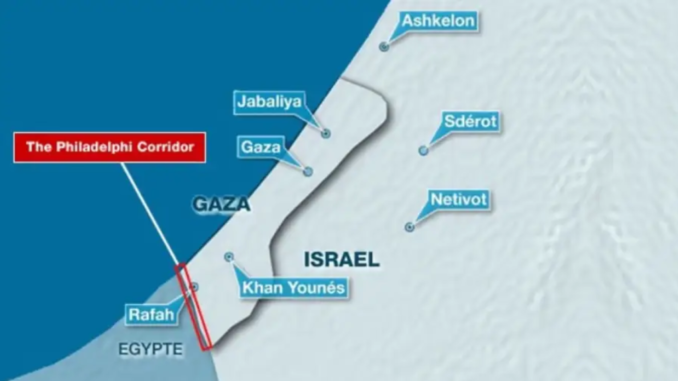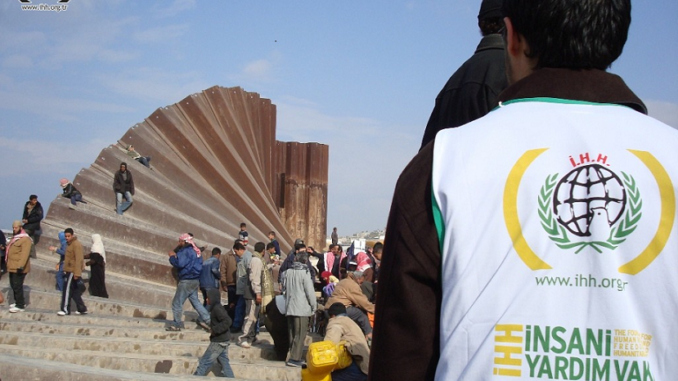Brig.-Gen. (res.) Yossi Kuperwasser | August 22, 2024

Institute for Contemporary Affairs, Founded jointly with the Wechsler Family Foundation, Vol. 24, No. 16
- The Israeli military presence along the Philadelphi Corridor between Gaza and Egypt is essential to ensure that Hamas will face considerable difficulties in its expected efforts to reconstruct and resupply its terror enterprise in Gaza. The closure will hamper its ability to smuggle in weaponry, personnel, and even vehicles and funds from Egypt through the vast network of tunnels they constructed under the corridor, through the Rafah border crossing itself, and via other routes.
- After revealing and neutralizing all the tunnels, Israel will have to erect an underground barrier along the corridor similar to the one it built along the Gaza-Israel border. The IDF will have to be deployed along the corridor to ensure that the underground barrier, the aboveground wall, the monitoring of the Rafah crossing, and the other elements of the systems designed to prevent smuggling are functioning so that any infiltration attempt will be thwarted immediately.
- The chances that Egyptian, Arab, international forces or Palestinian Authority forces will effectively meet this challenge are paltry. This idea was tried in the past and failed miserably. There is no reason to believe that another time will be different. In light of this, there is no substitute for a physical Israeli presence along the corridor to prevent smuggling.
- Such a presence is also essential for additional strategic reasons. First is the need to shape a new reality in Gaza. If the overall military control that is needed to combat terror is to be in Israel’s hands, Israel needs to maintain control of all of Gaza’s borders, including the Philadelphi Corridor. Any other arrangement will make it almost impossible for the IDF to prevent the emergence of terror threats from Gaza.
- Second, lasting Israeli control of the Philadelphi Corridor is what will preclude Hamas control of the strategic passage. The ongoing physical change on the ground will constitute a message to Hamas, the other members of the Iranian axis, and the Palestinians, in general, that the Oct. 7 terror attack was a strategic error that significantly harmed the advancement of their goals, chief among them the elimination of Israel.
- Israeli deployment along Philadelphi can serve to make clear to the Iranians and Hizbullah that whoever launches a war against Israel pays a strategic price for it.
The Israeli military presence along the Philadelphi Corridor between Gaza and Egypt is essential to ensure that Hamas and the other terror organizations will face considerable difficulties in their expected efforts to reconstruct and resupply the enormous terror enterprise they had built in the Gaza Strip. The closure will hamper their ability to smuggle the weaponry and the other means of warfare, personnel, and even vehicles and funds that Hamas and the Islamic Jihad had brought from Egypt through the vast network of tunnels they constructed under the corridor, through the Rafah border crossing itself, and via other routes.
After revealing and neutralizing all the tunnels, Israel will have to erect an underground barrier along the corridor similar to the one it built along the Gaza-Israel border. The IDF will have to be deployed along the corridor to ensure that the underground barrier, the aboveground wall, the monitoring of the Rafah crossing, and the other elements of the systems designed to prevent smuggling are functioning so that any infiltration attempt will be thwarted immediately.
Clearly, on the day the shooting stops, the Gaza terror organizations will launch a gigantic effort to smuggle weapons into the Strip, and the more the Israeli presence along their vital artery shrinks, the easier it will be for them. The chances that Egyptian, Arab, international forces or Palestinian Authority forces will effectively meet the challenge are paltry. This idea was tried in the past and failed miserably. There is no reason to believe that another time will be different.
Before the 2005 disengagement, Prime Minister Ariel Sharon argued that if Israel left the Philadelphi Corridor, the world would recognize the fact that Israel was no longer the occupying power in Gaza. It was explained to him that not only would that not happen, but evacuating the Philadelphi Corridor would enable the flood of enormous quantities of weapons. Sharon insisted – and the gloomy forecasts materialized when a Palestinian mob tore down the wall, and vast numbers of weapons flowed to Rafah in front of the Egyptian soldiers who did not lift a finger. Did that mean the IDF again had to take control of the corridor? Israel could have done so – but it had not “left just to come back again.” Instead, Sharon sent a senior military delegation to complain to the Egyptians. The complaint was duly recorded, and the smuggling continued and even intensified.

The security establishment claims that if Israel now leaves the Philadelphi Corridor and the smuggling resumes, the IDF will be able to return and retake control of the corridor. Militarily speaking, Israel could have done that as well in 2005 and 2008 but refrained, and this time, too, there will be reasons to refrain. The United States will promise to pressure Egypt and will warn that such a military move could cause severe harm to civilians and lead to a regional war; the Egyptians will demand proof of the smuggling and warn of damage to Israeli-Egyptian ties; and Iran, through its proxies, will threaten a harsh response. It is also doubtful whether Israel will be able to detect the smuggling. In that regard, Israeli intelligence has not been particularly impressive.
Boots on the Ground
In light of all this, there is no substitute for a physical Israeli presence along the corridor to prevent smuggling. However, such a presence is essential for additional strategic reasons. First is the need to shape a new reality in Gaza for “the day after” the war. If the overall military control that is needed to combat terror is to be in Israel’s hands, Israel needs to maintain control of all of Gaza’s borders, including the Philadelphi Corridor. Any other arrangement will make it almost impossible for the IDF to prevent the emergence of terror threats from the Strip. Eventually, Israel would return to the reality of October 7, 2023.
Second, lasting Israeli control of the Philadelphi Corridor is what will preclude Hamas control of the strategic passage. The ongoing physical change on the ground, compared to the situation before the war, will constitute a message to Hamas, the other members of the Iranian axis, and the Palestinians, in general, that the October 7 terror attack was a strategic error that significantly harmed the advancement of their goals, chief among them the elimination of Israel. Apart from the warfare against Hamas, the Israeli deployment along Philadelphi can serve as a rehabilitator that can compel a process of Palestinian soul-searching and make clear to the Iranians and Hizbullah that whoever launches a war against Israel pays a strategic price for it.
Against all these weighty considerations stands the urgent need to free the hostages, who are suffering terribly and whose lives are endangered. In Hamas’s view, precisely in light of what has been said here, it must insist on its demands regarding Philadelphi so that it can claim that the terror onslaught was a wise and justified move that proved itself from a strategic standpoint. Thus, the conflict over this issue pertains to preventing smuggling and a broader context. An Israeli concession here will be interpreted by Hamas, Iran, and its proxies as evidence of the triumph of their approach, enabling them to make excuses for and justify postponing the direct response to the blows they recently suffered. The mediators are trying to find an arrangement that will allow both sides to say they achieved their goals and that will also safeguard the interests of Egypt, the United States, and Qatar themselves, chief among them preventing a regional escalation and ending the suffering of the Gazan population. So far, without success, though there seems to be some slow progress in this direction.
It still appears that the best way to progress toward a solution is to ramp up the military pressure on Hamas while making clear that continued stubbornness on the organization’s part will entail a high price.



One of Israel’s highest priorities is to return the populations of all the towns and villages along the border region with Gaza. They will not return based on the promise from the past that the IDF will be there to protect them. They must be given back all the arms that were confiscated before Oct 7 and anything else they might need to protect themselves. These patriots are amongst those that are fighting in the Gaza Strip right now. If they can be trusted to use arms to fight the war, they can be trusted to protect themselves too.